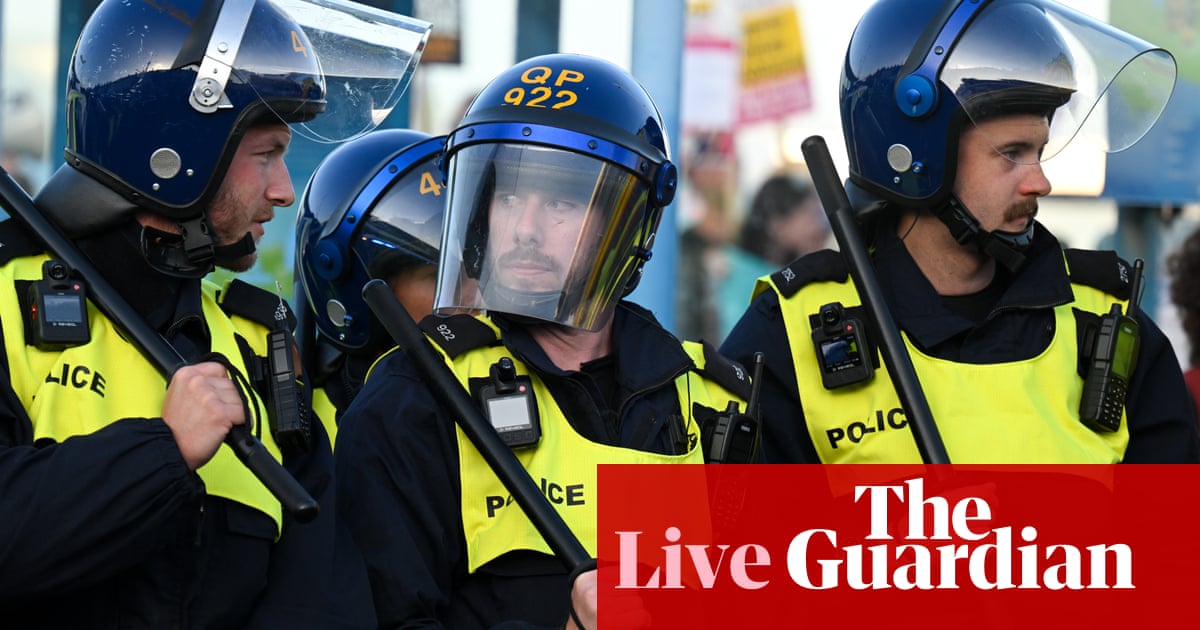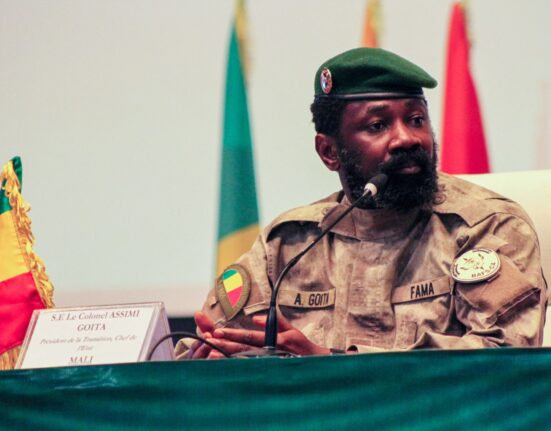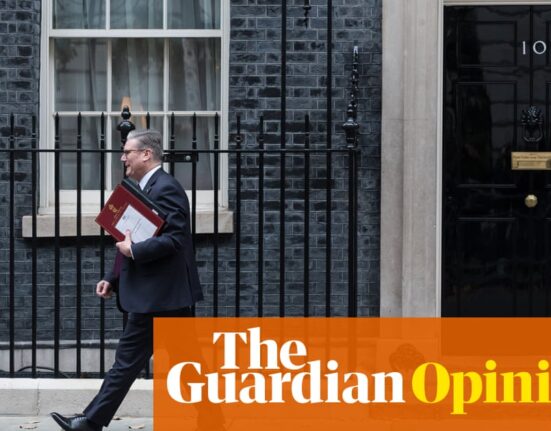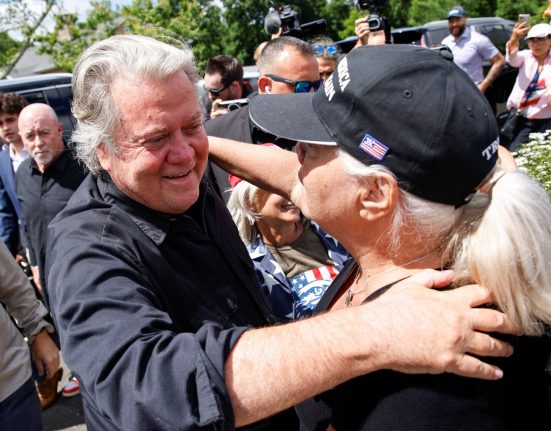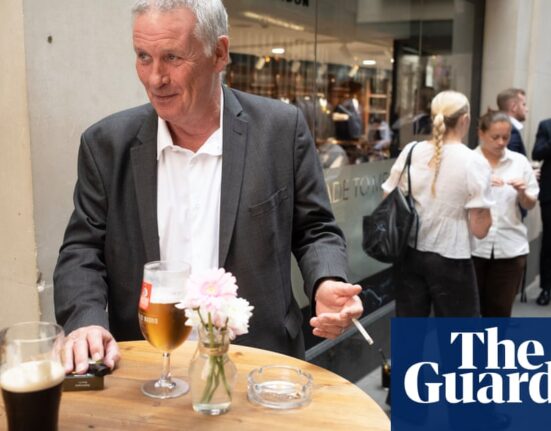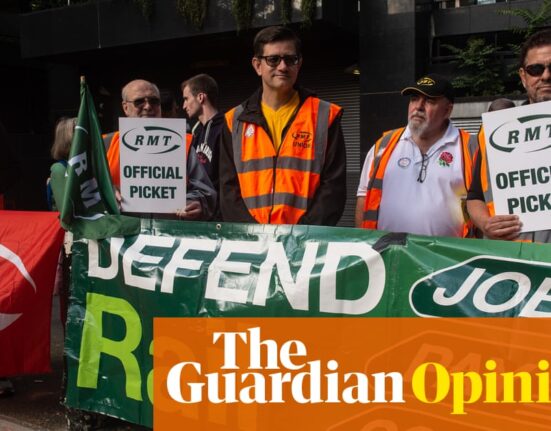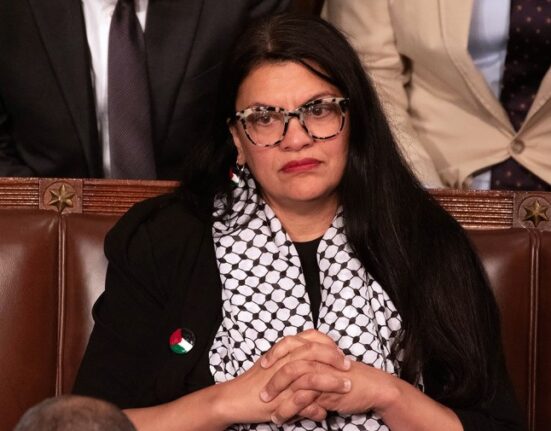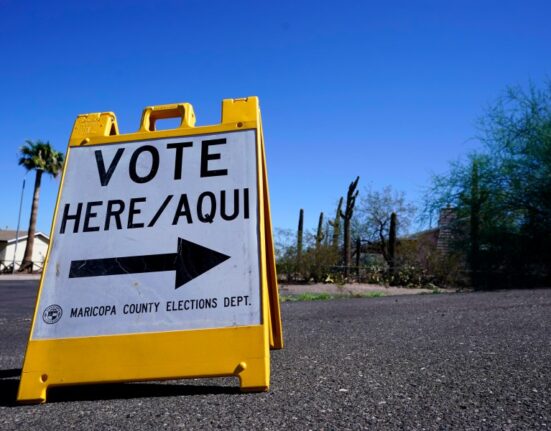Rioter who punched police officer in face in Southport jailed for three years
Josh Halliday
Josh Halliday, our North of England editor, reports on the court hearing this morning at Liverpool crown court:
The hearing at Liverpool crown court was told that an “unprecedented” 93 Merseyside police officers had been injured during the unrest over the past eight days, with more injuries being assessed daily.
In a statement read to court, the Merseyside police chief constable, Serena Kennedy, said officers had suffered a range of physical injuries – including a broken jaw and lost teeth – while some have been waking in the night with panic attacks.
Police had expressed “disbelief” that no officer had been killed in the unrest, Kennedy said, though many were left fearing whether they would “return home safely to their families”.
Derek Drummond, 58, pleaded guilty to violent disorder and assaulting an emergency worker. He has been jailed for three years, in the longest prison sentence so far over the far-right disorder in England and Northern Ireland.
Read more here: Rioter who punched police officer in face in Southport jailed for three years
Key events
Head of counter-terrorism policing confirms it is ‘actively assessing incidents’ and supporting forces across the UK


Vikram Dodd
Vikram Dodd is the Guardian’s police and crime correspondent:
Britain’s head of counter-terrorism, assistant commissioner Matt Jukes, has confirmed his command’s involvement in the huge police response to the violent disorder of the last week.
Jukes vowed to use terrorism laws to prosecute people, if merited.
It comes after his immediate predecessor as head of counter-terrorism, Neil Basu, told the Guardian on Monday, that some of the worst violence had crossed the line into terrorism.
Jukes confirmed for the first time that counter-terrorism detectives are involved in some of the investigations into the violence: “Counter-terrorism Policing is actively assessing incidents to understand whether terrorism legislation should be applied and we will make those judgements without fear or favour.”
Until now regular detectives have been leading the investigations, and currently that remains the case.
In his full statement, Jukes said:
Counter-terrorism policing is supporting forces across the UK in their response to the disgraceful disorder we have seen on our streets.
This includes using our specialist capabilities to support the full range of police activity, including intelligence gathering and informing operational planning.
We know that many people will feel vulnerable at this time, and we are supporting local forces with protective security expertise and advice.
We have seen terrible examples of violent crime, disorder and criminal damage, and charges are already being brought across the country. I am very clear that using terrorism legislation or declaring activity as terrorism has not been, and will not be, ruled out.
Counter-terrorism policing is actively assessing incidents to understand whether terrorism legislation should be applied and we will make those judgements without fear or favour.
Our message to those involved in this disorder is; we are watching and we will not hesitate to use our powers to protect our communities.
Our Politics Weekly UK podcast has just launched an episode about the far-right violence that has been seen in England and Northern Ireland in recent days. In it, Gaby Hinsliff speaks to the Guardian’s deputy political editor, Jessica Elgot, and Nazir Afzal, the former chief prosecutor for the north-west of England.
Listen to it here: Politics Weekly UK – Will the threat of arrests be enough to stop far-right violence?
Northern Ireland secretary Hilary Benn has said he is “shocked and angry” that businesses in the region had been targeted during violence after anti-immigration protests.
PA Media reports Benn said he met some of the business owners who have been attacked and PSNI officers who have been dealing with the violent disorder.
At a press conference at a community centre in Belfast, held with Northern Ireland Office minister Fleur Anderson, he said it was “really important” that people who are “shocked and angered and disgusted by what is happening speak up”.
Benn said: “People are entitled to protest and people are entitled to their political views, but there is no justification whatsoever for engaging in this kind of violence that is targeting particular communities.
“Members of these communities, some of whom I’ve met today, are frightened. People are afraid to go out of their own houses.”
Sinn Féin MLA Deirdre Hargey earlier made a statement after meeting with Benn. She said “Today’s meeting was an opportunity to press upon him the urgent need to support businesses damaged by racist violence. I also told the British secretary of state that the PSNI urgently needs additional resources to deal with sporadic racist violence.
“It is important that police have every tool available to protect life and property, and to bring those responsible for this reprehensible racist behaviour to justice. Racist disorder is not welcome or reflective of Belfast and our people. All hate, discrimination, racism and intimidation must be eradicated from our society.”


Damien Gayle
Police officers will be stationed at strategic holding points around the country so they can “intervene early and … intervene hard” at short notice where violence flares in coming days, a senior police officer has said.
Sir Andy Marsh, chief executive of the College of Policing, which represents police forces in England and Wales, outlined the plan in an interview with Sky News on Wednesday afternoon, as the UK anticipates more widespread disorder.
The Guardian earlier reported that more than 6,000 public order trained officers would be on duty on Wednesday night, with officers from London and the south-east sent to the north-west and north-east where the worst violence is expected. Police intelligence said that more than 100 far-right led protests are planned.
Marsh said he would be convening a “knowledge sharing event” for public order commanders on Wednesday where they would “think about the tactics we need to use, the powers and the conditions.” He told the broadcaster:
We are seeing a huge mobilisation of police officers, the biggest since 2011, and those officers are mobilising to strategic holding points and they will intervene early and they will intervene hard where the law is being broken
Every single one of the police forces, and I heard in the lead in you said that two forces are not anticipating any – if we call it protest – locations, but every police force will have significant numbers, including neighbourhood police, out on their streets today [and] tonight making sure that people can go about their lives as safely and as normally as possible.
We have changed our approach actually, we would normally work from something that’s called mutual aid. Where a force can’t cope they apply for mutual aid either in advance or spontaneously. We know that that’s not quick enough, that’s precisely why we are moving to this new approach for this series of violence, so that we can get the right numbers of officers quickly enough to the right place to arrest the people that are responsible, put them before a court, and protect the community. That’s our priority.


Ben Quinn
48 locations mentioned as possible locations for far-right mobilisations are being prioritised by the anti-racism group Hope Not Hate, which monitors extremists.
It comes as police are bracing themselves for more than 100 protests across the country tonight amid threats by far-right groups to target immigration services
A list of 39 locations was compiled and released on channels on the Telegram social media platform in recent days.
Hope Not Hate described this as a “hitlist” of aspirational targets that called for action, up to and including terrorism by far-right groups.
“However, what started as an aspirational list of locations, primarily targeting service providers for refugees and asylum seekers, has subsequently been spread widely around the internet and is being discussed as a list of locations for protests, disturbances or attacks,” the organisation said in a briefing note.
“The wide circulation of this list has caused a great deal of distress, unease and fear within the communities mentioned. Indeed, this list has been compiled precisely to spread these emotions within Muslim and immigrant communities. Understandably, many are now organising counter-protests and demonstrations to defend the locations listed for attack.”
Neha Gohil, community affairs correspondent at the Guardian, has spoken to activists who opposed the UK far right in 1970s. You can read that here:
Labour Liverpool city councillor Ruth Bennett says her and her fellow councillors have been “overwhelmed” by the support for the Spellow Library on County Road which was fire damaged by far-right rioters.
PA Media reports Bennett said “We have been overwhelmed by the generosity of our residents, partners and people from right across the country.
“From thousands of pounds of cash donations to replace destroyed books and IT equipment, to the use of building spaces so that community services can continue at a time when they are most needed, the thoughtfulness and generosity has been overwhelming. It shows the very best of the people of Liverpool and beyond.”
Liverpool city council said activities planned for the library over summer had now been relocated.
Here is a video clip of the Metropolitan police commissioner, Mark Rowley, who has said accusations of two-tier policing are “complete nonsense” and that those making the claims were putting officers at risk.
Diane Taylor writes for the Guardian today, arguing that lies flourished in a vacuum where governments were scared to look soft on asylum seekers, much less dare to express any humanity:
The rate at which asylum claims were processed slumped from 2016, partly due to inefficiency and partly, I imagine, because ministers feared that processing asylum claims too quickly would signal to voters that the UK was a soft touch. The growing backlog and the pandemic were a perfect storm that led to an explosion of hotel use – and the gift of a photo opportunity for the far right, which turned up regularly at this accommodation to bait bewildered asylum seekers and capture exchanges on film they could livestream.
The discontent of far-right, anti-migrant voters was nourished with toxic narratives from the likes of former home secretaries Priti Patel and Suella Braverman, the former slamming immigration and human rights lawyers doing their jobs as “lefty lawyers” and the latter scaremongering that 100 million asylum seekers could cross the Channel to invade the UK.
While legislating against the peddling of racist lies online, and the conviction and imprisonment of those who have participated in current disorder, are important, there’s one thing politicians haven’t tried. It isn’t complicated to implement and it doesn’t cost anything. Start telling the truth and tell it over and over again. Disseminate factually accurate information with confidence through schools, community and faith groups, local authorities and other organisations.
Read more from Diane Taylor’s opinion column here: Politicians – there’s an easy remedy to the violence we’re seeing across the UK. Start telling the truth
John Hyde, who is deputy news editor for Law Society Gazette, has made the point that “swift justice is fine” but offers the suggestion that “it might be worth an explainer from the CPS and Ministry of Justice at some point why these cases can be turned around so quickly when other cases take years.”
In doing so he raises the point that information vacuums can sometimes in themselves fuel accusations of two-tier policing. Shadow policing minister Matt Vickers made a point earlier about how visible the justice process is, telling Sky News viewers:
It would be helpful, actually, for more of the public to see what went through the courts in response to what had gone on in Middlesbrough [during the unrest]
So, two people go through the courts yesterday. One, being a person who turned up to protest actually, they’d seen this stuff online, gone down there to get involved in all this violence and disorder, and they deserve what’s coming.
And at the same time, I saw that somebody who turned up to counter protest, armed with a knife, was feeling the full force of the law. And that’s exactly what should happen.
Writing in the Spectator, Stephen Webb, formerly director at the Home Office and the Cabinet Office, and now working as head of government reform and home affairs at the right-leaning Policy Exchange thinktank, argues that a perceived lack of information is what allowed “rioters to believe the lies”. He claims:
The willingness to believe lies is a symptom of decaying trust in official channels. Government, the media and the police need to have a hard look at their own communications and whether they may have contributed to this mistrust, even from the best of intentions.
Many believe the authorities’ priority is to preserve community relations at all costs, including by damping down discussions of particularly sensitive crimes; and that many of the media outlets cooperate. This might not be the case but there is a pattern here.
Much of the current messaging focuses exclusively on the far-right as the perpetrators, but less on the intimidating ‘counter protests’ involving groups of masked men.
Prime minister Keir Starmer has used his social media channel to share a clip of a news announcement of the sentencing of rioters for violent disorder with the message “This is the swift action we’re taking. If you provoke violent disorder on our streets or online, you will face the full force of the law.”
This is the swift action we’re taking.
If you provoke violent disorder on our streets or online, you will face the full force of the law. https://t.co/P8wYEibor2
— Keir Starmer (@Keir_Starmer) August 7, 2024
Greater Manchester police have issued a statement addressed to the local community in their are of operation, in which they say these are “challenging times” but that the force is “immensely proud to see the majority of our residents standing together and condemning this unacceptable disorder.”
In the statement, the force says that “to date, we have made 26 arrests for a variety of offences including assault, violent disorder, possession of weapons, and 20 have been charged.”
It says:
We understand the uncertainty and worry that people are feeling about current tension, much of which is being fuelled by the widespread sharing of misinformation online which is sometimes being created with the purpose of creating fear and inciting intolerable hate.
Our advice to communities is to remain calm and to try to go about your every-day life. GMP continues to monitor the intelligence to ensure we can respond effectively to any incidents of disorder. And, if we believe there needs to be specific information about anything emerging we will tell people and offer advice.
We are heavily resourced, and we have specialist officers and staff who are working around the clock to tackle these issues and ensure our communities are supported. We are speaking to community leaders and elected representatives regularly to make sure they are appraised of all planned protests known to GMP. People living safely and peacefully, do not deserve to be frightened: we are here to protect you, and we will use all resources and capabilities to do so.
The statement concludes by telling the public that “your unwavering support has not gone unnoticed.”
My colleague Ben Quinn has put together this guide to several of the factions of the far-right operating in Britain.
Jenrick defends statement that arrests should be made over ‘Allahu Akbar’ shouts on street
Robert Jenrick, who has been criticised for his use of words earlier today, when he said “I thought it was quite wrong, that somebody could shout about Allahu Akbar out on the streets of London and not be immediately arrested”, has posted to social media to defend his use of language.
He has posted a video clip of an incident he claims to have been citing, adding:
“Allahu Akbar” is spoken peacefully and spiritually by millions of British Muslims in their daily lives. But the aggressive chanting below is intimidatory and threatening. And it’s an offence under section 4 and 5 of the Public Order Act. Extremists routinely abuse common expressions for their own shameful ends. All violence must end. All violence must be called out.
‘Allahu Akbar’ is spoken peacefully and spiritually by millions of British Muslims in their daily lives.
But the aggressive chanting below is intimidatory and threatening. And it’s an offence under Section 4 and 5 of the Public Order Act.
Extremists routinely abuse common… pic.twitter.com/XpLJ9OilyC
— Robert Jenrick (@RobertJenrick) August 7, 2024
Sayeeda Warsi has responded, repeated her earlier criticism of Jenrick. She said:
No Robert you do not get to go on national broadcasters and say one thing and try and pretend you said something else after! If you genuinely feel your comments on Sky News were inappropriate, offensive, incendiary and anti-Muslim (which they were) then start by apologising.
Then you can go back to pretending you are a responsible candidate for the leadership of our party. Not prepared to let you and other colleagues get away with this gaslighting and playing these games any more – too much damage has already been done to our country and it deserves better than this populist nonsense.
No Robert you do not get to go on national broadcasters and say one thing and try and pretend you said something else after!
If you genuinely feel your comments on @SkyNews were inappropriate, offensive, incendiary and anti Muslim ( which they were) then start by apologising… https://t.co/5fkF6HdMU2— Sayeeda Warsi (@SayeedaWarsi) August 7, 2024
Section 4 and 5 of the Public Order as referenced by Jenrick make no explicit mention in law to the words “Allahu Akbar”, but make it an offence to:
use towards another person threatening, abusive or insulting words or behaviour, or distribute or display to another person any writing, sign or other visible representation which is threatening, abusive or insulting, with intent to cause that person to believe that immediate unlawful violence will be used against him or another by any person.
or
use threatening words or behaviour, or disorderly behaviour, or display any writing, sign or other visible representation which is threatening, within the hearing or sight of a person likely to be caused harassment, alarm or distress thereby.



